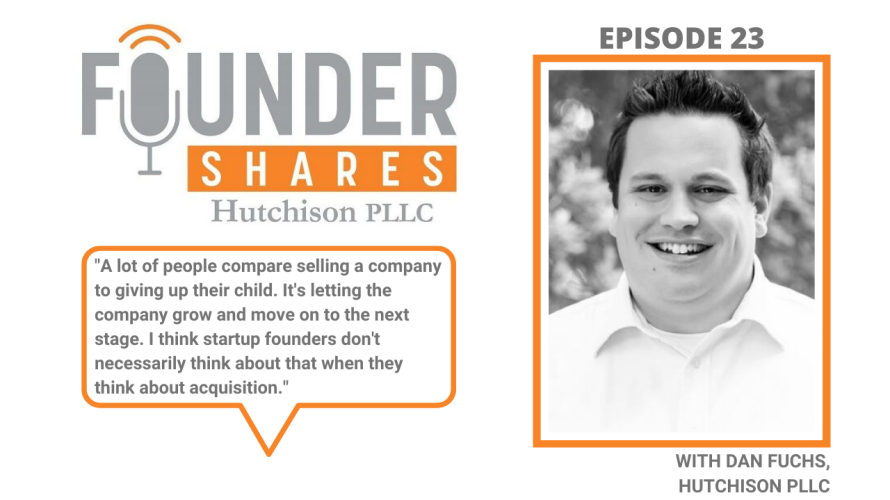Everything You Need to Know but Didn’t Know to Ask about Startup Acquisitions

While we love talking with founders on the Founder Shares podcast, it’s always wonderful to talk with another startup attorney, and, on this episode, we had the pleasure of talking with Dan Fuchs, fellow Hutchison attorney and managing partner.
Dan focuses on mergers and acquisitions, venture capital investments and corporate finance, and he sees how difficult it can be for founders to exit their companies.
“A lot of people compare it to, sort of, giving up their child,” Dan said. “You raise this baby from inception, and it's your idea. You've nurtured it throughout, and it's sort of letting the company grow to the next stage, with still some guidance from you, but in the hands of other people and on its own and running forward.”
At Hutchison, we primarily see two types of exits: stock acquisitions and asset purchases. Stock acquisition is the buying of the entity, all of the assets and liabilities wrapped-up in one nice package. Asset purchases require the selection of certain assets and certain liabilities, not necessarily the entity.
And Dan said that, if you’re ever planning on exiting your company, you should plan for acquisition as early as possible.
“The reason why I say that is it influences the path that a lot of companies take,” Dan said. “As soon as you start forming your team, you need to be on the same page with your co-founders and the other people that you're working with, is this something that we're eventually going to sell?”
He said that it’s also important to think about where your capital is coming from. If you plan to take sophisticated capital, capital that comes from those outside of your friends and family, it’s typically a seven year investment horizon, meaning those investors are going to want to exit that investment in the next four to seven years.
So it’s key to align with your investors early on, too, about what your company’s future looks like, being realistic about what it might take the shape of.
“You're not going to have all the answers,” Dan said. “You're not going to know what this could turn into. Everybody thinks they're going to be the next unicorn, but if you have a niche product and there's only one or two buyers that you could see buying the company, you need to factor those things in pretty early on.”
So, if you’re planning an exit, when should you start preparing? Dan’s answer is 12 to 18 months in advance, before you start going to the market and trying to find buyers.
Dan said that staying on top of your organizational aspects is essential, from the very beginning. Keep copies of your contracts, and have someone in your company who keeps your dataroom in order.
But when it comes to the final sale, the data isn’t the only thing.
“As much as anything it's storytelling,” Dan said. “What is the story of this company? Where has it been? What has it overcome and what is the bright future that you can sell to a new buyer?”
To hear some of those stories, and Dan’s essential questions to ask yourself before acquisition, tune in to his episode of the Founder Shares podcast below or wherever you like to listen to podcasts.
And if you’re a founder in need of legal services, Hutchison PLLC is here to help.
The blog content should not be construed as legal advice.


Show Comments / Leave a Comment
Comments
There are no comments yet.
Leave a Comment